Subject
The cursus honorum (Latin for 'course of honors', or more colloquially 'ladder of offices'; Latin: [ˈkʊrsʊs hɔˈnoːrũː]) was the sequential order of public offices held by aspiring politicians in the Roman Republic and the early Roman Empire. It was designed for men of senatorial rank. The cursus honorum comprised a mixture of military and political administration posts; the ultimate prize for winning election to each "rung" in the sequence was to become one of the two consuls in a given year. These rules were altered and flagrantly ignored in the course of the last century of the Republic. For example, Gaius Marius held consulships for five years in a row between 104 BC and 100 BC. He was consul seven times in all, also serving in 107 and 86. Officially presented as opportunities for public service, the offices often became mere opportunities for self-aggrandizement. The constitutional reforms of Sulla between 82 and 79 BC required a ten-year interval before holding the same office again for another term.To have held each office at the youngest possible age (suo anno, 'in his year') was considered a great political success. For instance, to miss out on a praetorship at 39 meant that one could not become consul at 42. Cicero expressed extreme pride not only in being a novus homo ('new man'; comparable to a "self-made man") who became consul even though none of his ancestors had ever served as a consul, but also in having become consul "in his year". Source: Wikipedia (en)
Works about cursus honorum 1
Subject - wd:Q27518
